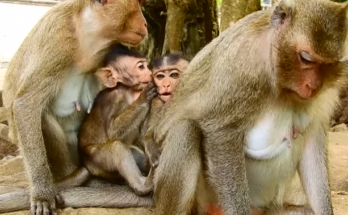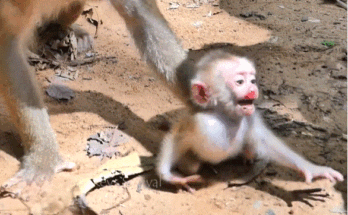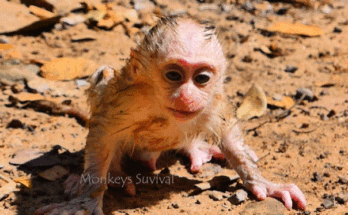The ancient stones of Angkor Wat rise proudly above the jungle canopy, their shadows stretching across a forest alive with whispers of life. In this sacred place, where time seems to hold its breath, I witnessed a moment that will stay in my heart forever.
A mother monkey, weary from survival in the harsh jungle, cradled her newborn in trembling arms. At first, the scene felt like a tender portrait of love—tiny fingers clinging desperately to the fur of the one who should have been her safest shelter. But then, in an instant that shattered the peace, that comfort turned into pain.
The mother, perhaps frightened, stressed, or overwhelmed, lashed out. Her movements were harsh, too heavy for the fragile body of her tiny newborn. The baby’s cry cut through the air—high-pitched, trembling, filled with confusion. It was the sound of innocence shaken, the sound of a creature who had only just entered this world but was already learning how cruel it could sometimes be.
I froze. Around me, the forest grew quiet, as though even the cicadas and birds held their voices. The baby’s body quivered, his small chest rising and falling with panicked breaths. He didn’t understand. How could he? The only being he trusted, the one who gave him life, had become the source of his deepest fear.

And yet… within those fragile cries, there was still a desperate plea for closeness. Despite the pain, he tried to crawl back toward his mother’s warmth, his instinct stronger than his fear. That was the moment that broke me most—not just the roughness of the mother’s hands, but the baby’s unshaken hope that she might love him still.
As I watched, my heart ached with questions: Why do some mothers turn harsh? Is it the endless hunger, the heat, the struggles of the jungle that push them past tenderness? Or is it simply a moment of instinct, one that she might later regret in silence?
In the U.S., many of us have seen mothers struggle under the weight of exhaustion, stress, and fear. Sometimes, love is there, but it comes wrapped in pain. Sometimes, children grow up in homes where tenderness is mixed with harshness, where safety is complicated by survival. Watching this tiny newborn reminded me that these truths are not just human—they echo across species, across time, across forests and cities alike.
The baby’s cry continued, softer now, but each note pierced the heart. The scene left me standing there, helpless, wishing I could reach out, cradle him, whisper to him that he deserved gentleness, that the world could be kind.
But I also saw something else. In the baby’s persistence, in the way he clung despite the hurt, I saw resilience. A newborn heart, already learning the hardest lesson of survival: that life will test you, but the will to endure can be stronger than pain.
Later, as the shadows shifted and the mother calmed, she drew her baby closer again. Her grooming softened, her gaze lingered a little longer. It wasn’t perfect. It wasn’t the tender embrace every newborn deserves. But in that moment, it was enough for him—enough to quiet his cries, enough to remind us that even broken love still carries traces of warmth.
This is the story the forest gave me: a reminder of the fragility of life, of how even the smallest cry can carry the weight of survival. And perhaps, in hearing it, we are reminded to look at the mothers and children in our own world with more compassion. We may not always understand their struggles, but we can choose to respond with empathy instead of judgment.


